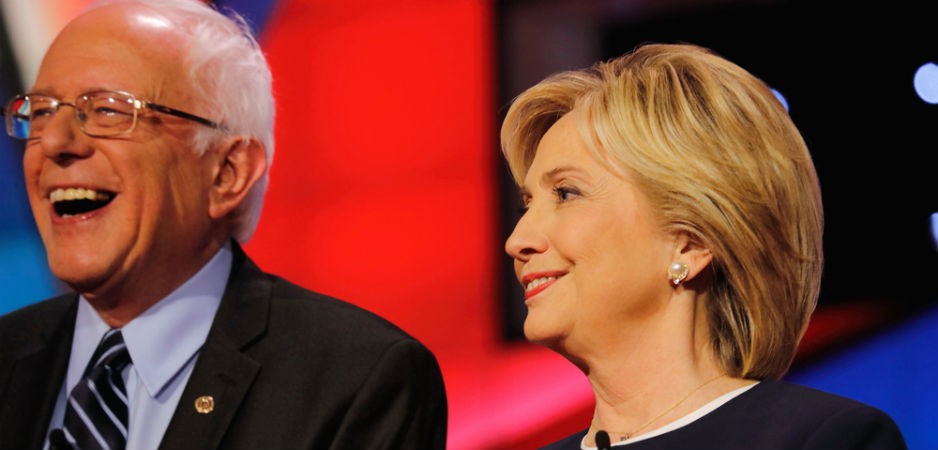By looking at casting directors and Hollywood, Amy Cook examines who will stand in the 2016 US presidential election.
If you want to know who won the last debate or who will win the next one, you shouldn’t ask a political pundit—you should ask a casting director.
We Americans would like to believe that we are choosing a candidate for president based on who makes the best arguments or advances the best policies, but it is more honest to admit that we are looking for a leading man or woman to play a theatrical role.
While it is a cliché that we vote for candidates as if for an actor playing a role, recent insights from both researchers of stereotyping and insights from actual casting directors show it is true. I am a theater director and scholar who integrates cognitive science into my study of Shakespeare, performance and audience response, and this primary season feels like a casting call where there is really only one choice for the role.
Voters make decisions in much the same way that a Hollywood or theatrical casting director makes choices about actors for roles; which actor auditioning “feels right” as a head of state? The winning candidate best fits the way we wish to imagine the “movie” of the next four years of our collective lives.
Drew Weston, a psychologist at Emory University, reported in 2006 on fMRI studies that while watching video of potentially damaging political information about preferred political candidates, the part of the brain associated with reasoning was calm and the parts associated with emotions were active. This, he concluded, is evidence that our emotions play a central role in candidate selection.
In the 1970s, Eleanor Rosch, a psychologist at the University of California, Berkeley, showed that categories are defined by prototypes, not a list of rules or qualifications. This means our category of “chair” may be defined by a dining room chair, but can be expanded to include a barstool or beanbag. Based on years of studying color recognition in speakers of the Dani tribe in New Guinea, Rosch and her colleagues showed that although the Dani speakers did not have words for certain colors, they could see them and have a conceptual category for them; their language did not wholly determine their conceptual system. Thus, she argued, “human categorization should not be considered the arbitrary product of historical accident or of whimsy but rather the result of psychological principles of categorization, which are subject to investigation.”
Our category of “president” is not based on a set of conditions to be met for inclusion—intelligence, experience, policy insight, leadership. It is based on similarity to prototypes. The prototypical American president may look like Michael Douglas or Ronald Reagan, but that doesn’t mean someone like FDR or Hillary Clinton might not fit.
Categories do not expand easily, however, as people assume they are based on an objectively-assessed set of shared properties. In which case, changing what or who belongs in the category of “chair” or “president” cannot happen easily.
It’s reasonable to assume that there’s a sizable portion of the public who could not and do not see candidate, and now president, Barack Obama as president. They will continue to perceive him as being fundamentally miscast because, for them, being a white male feels like one of the requirements of an American head of state, and since they see categories as fixed, they are inexperienced with category expansion or change. This reaction, while still more than one might expect from policy disagreement, is better understood as category confusion than simple racism.
Acting the Role
Casting directors know that you can, with care, bring audience members to expand their categories. Judi Dench became James Bond’s M in 1995 and spectators recognized her authority, intelligence and experience as close enough to the prototypical M that her gender was uncontroversial. When Dennis Haysbert was cast as presidential-candidate David Palmer, spectators understood that 24 took place in the near future.
What casting directors saw in Judi Dench, Dennis Haysbert, Glenn Close or Martin Sheen was what the American people are looking for in the candidates: someone who can “hold” and maintain authority. In Hollywood talk, the actor will have to be able to “carry the film.” In fact, Martin Sheen did that so well in the first couple of episodes of The West Wing that his role went from being a cameo to a lead; President Bartlett was not meant as one of the main characters, but Sheen’s president was incredibly popular with viewers.
In much the same way as candidates point to their experience as a CEO or governor, actors’ previous roles are part of the audition reel. Close’s VP in Air Force One (1997) gained authority as much from the actor’s roles in Fatal Attraction (1987) and Dangerous Liaisons (1988) as from the lines written by the screenwriter. In fact, given the insights of casting directors, actors/candidates need not be afraid of having personal baggage, even scandals or addictions, as this can make for good drama.
While the scope of what we can forgive evolves with time, Americans have always loved redemptions. Some of our favorite actors have been warmly received coming back from personal debacles. Robert Downey Jr’s history of arrests and drug addiction (and recovery) made him the super power to turn Iron Man into the highest grossing film of 2013 ($1.2 billion). Hugh Grant’s public arrest off Sunset Strip only added to his awkward charm in Notting Hill (1999). And audiences love movies about coming back from a low point. According to a 2004 BBC poll, It’s A Wonderful Life (1946) was voted the second best movie never to win an Oscar; The Shawshank Redemption (1994) was the first.
If actors/candidates are properly repentant about their mistakes, and are willing to be redeemed, Americans will identify with them, voting with their wallets or ballots. While President Bill Clinton’s refusal to be repentant over his affair with Monica Lewinsky made the scandal go on and on, candidate George W. Bush’s acknowledgement of over-drinking and his expressed regret boosted his approval ratings.
The Lead Actor is…
Jeb Bush would seem to have everything—and no past scandals to be sorry for. He is tall, white, comes from a political dynasty, has played the role of leader in Florida, has a strong political record and policy positions and he has raised lots of money. But Jeb Bush can’t escape being cast as the number two, the dad walking the dog next door. The fact NPR reported that he had the least air time during the second Republican debate is not at all surprising: he is always upstaged.
People are excited by the outliers like Bernie Sanders, Ben Carson and Donald Trump, but their popularity will not translate to votes. Casting directors would love to cast them as the eccentric neighbor or outspoken co-worker in the break room, but they would never cast them as the lead. The American people have a fascination with the idea of these candidates—in the same way that we loved Kramer on Seinfeld—but we don’t see them at the helm of their own show.
Based on the insights of casting directors, I’m willing to bet that the nominees will be Hillary Clinton on the left and Marco Rubio on the right, and Rubio will lose because Clinton best fits the category of leader. Indeed the Benghazi hearings, understood in this light, ended up giving Secretary Clinton what Hollywood calls a reel: hours and hours of the actor/candidate demonstrating her ability to play the part that she is up for.
The instincts we have may not make for the smartest democracy, but we can correct for the distortions in our perception only once we are aware of them.
The views expressed in this article are the author’s own and do not necessarily reflect Fair Observer’s editorial policy.
Photo Credit: Joseph Sohm / Shutterstock.com
 We bring you perspectives from around the world. Help us to inform and educate. Your donation is tax-deductible. Join over 400 people to become a donor or you could choose to be a sponsor.
We bring you perspectives from around the world. Help us to inform and educate. Your donation is tax-deductible. Join over 400 people to become a donor or you could choose to be a sponsor.
Support Fair Observer
We rely on your support for our independence, diversity and quality.
For more than 10 years, Fair Observer has been free, fair and independent. No billionaire owns us, no advertisers control us. We are a reader-supported nonprofit. Unlike many other publications, we keep our content free for readers regardless of where they live or whether they can afford to pay. We have no paywalls and no ads.
In the post-truth era of fake news, echo chambers and filter bubbles, we publish a plurality of perspectives from around the world. Anyone can publish with us, but everyone goes through a rigorous editorial process. So, you get fact-checked, well-reasoned content instead of noise.
We publish 2,500+ voices from 90+ countries. We also conduct education and training programs
on subjects ranging from digital media and journalism to writing and critical thinking. This
doesn’t come cheap. Servers, editors, trainers and web developers cost
money.
Please consider supporting us on a regular basis as a recurring donor or a
sustaining member.
Will you support FO’s journalism?
We rely on your support for our independence, diversity and quality.







